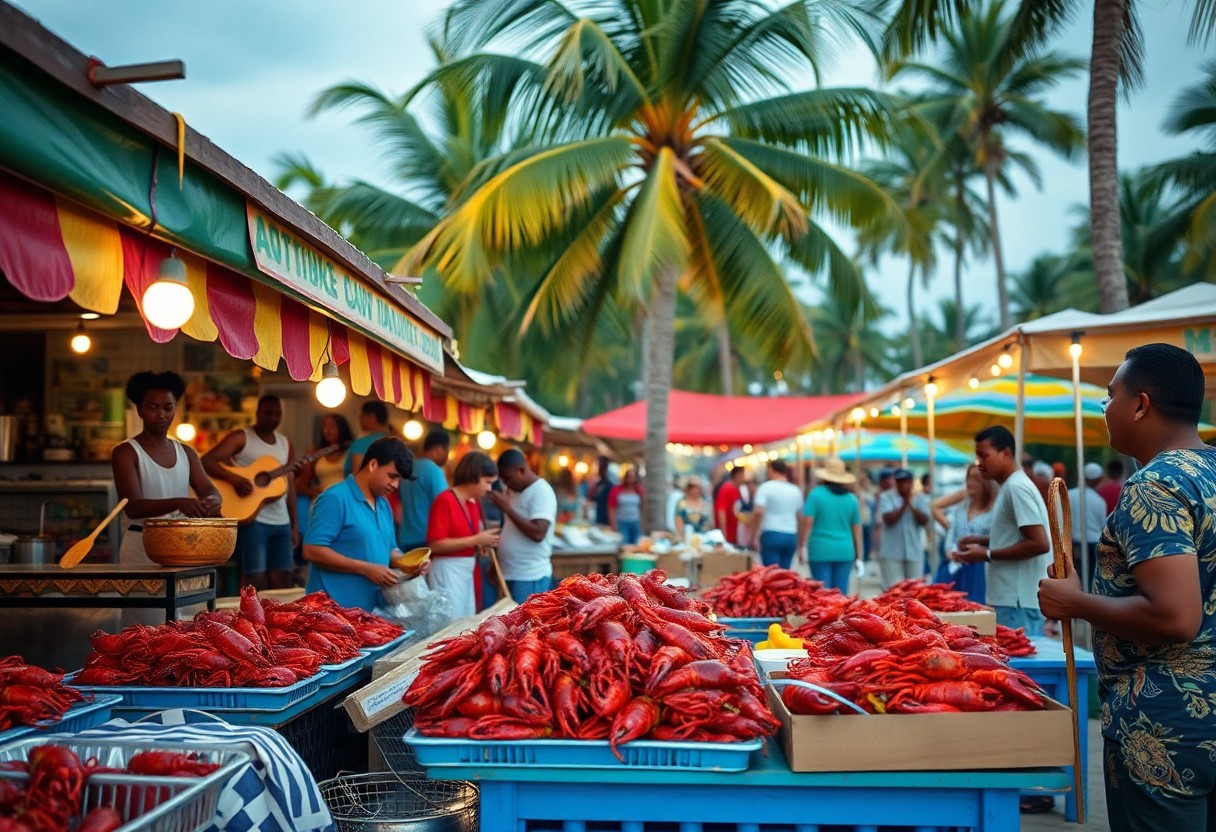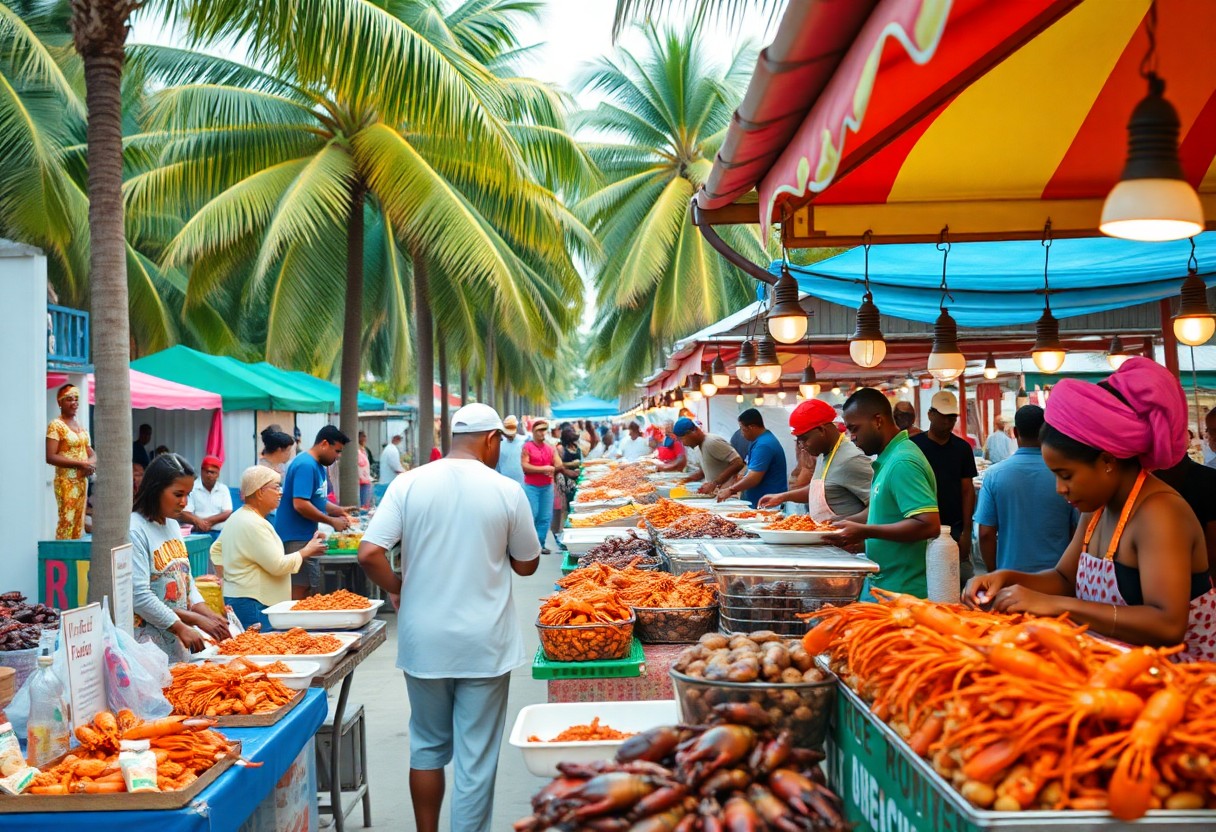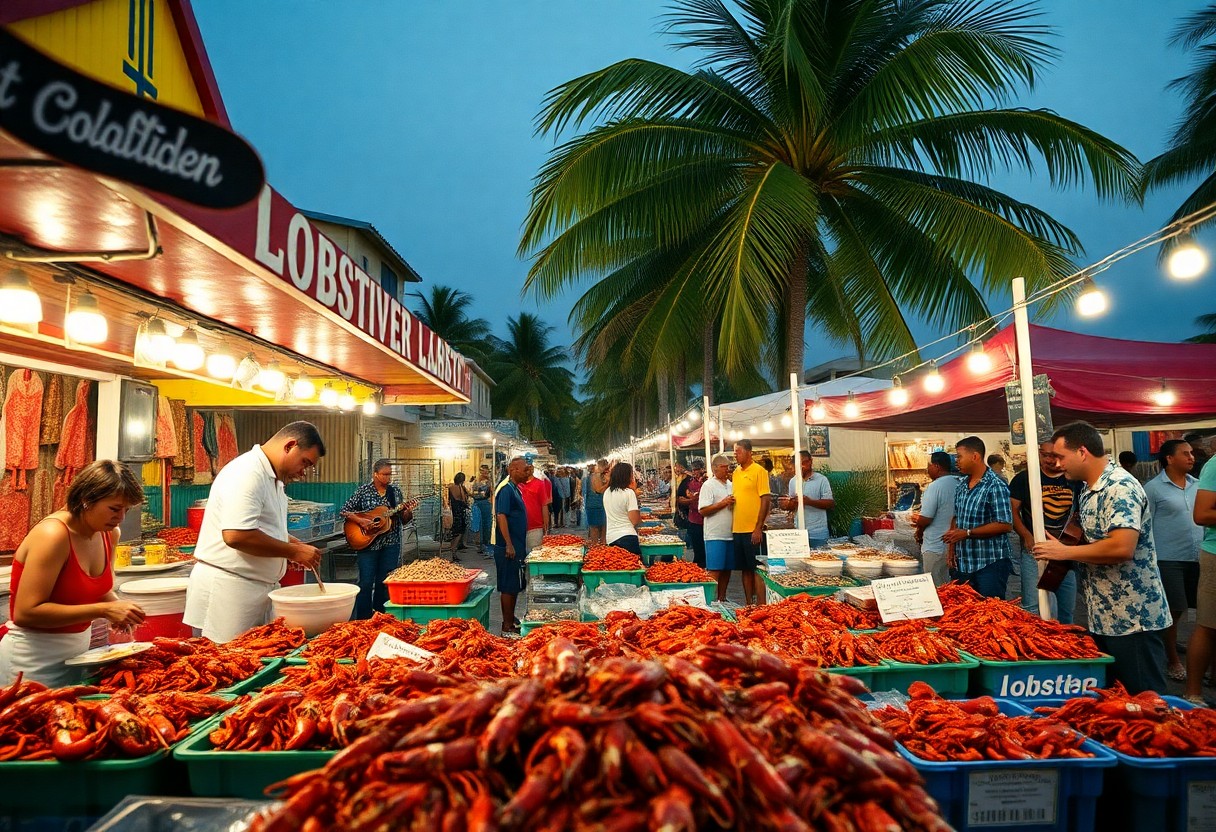Belize's lobster festivals present a captivating fusion of cultural heritage and coastal celebrations that entice both locals and tourists. By participating in these lively events situated in Caye Caulker, San Pedro, or Placencia, you engage yourself in a tradition that has thrived for decades. Each festival highlights sustainable fishing practices, essential for maintaining Belize's delicate marine ecosystem while simultaneously uplifting local communities. Attendees can indulge in a delectable variety of culinary offerings featuring fresh, locally-caught spiny lobster, which not only bolsters the economy of coastal towns but also enhances your culinary adventure. By attending these festivals, you contribute to the preservation of Belize's rich cultural heritage and its fragile marine environment.
Join the Vibrant Celebrations at Belize's Lobster Festivals
More than mere festivities, the Belize lobster festivals are dynamic cultural celebrations that bring together seafood gastronomy and treasured community traditions. Each spirited event radiates the warmth of Belizean hospitality and emphasizes the significance of sustainable fishing practices. Every year, these festivals attract over 15,000 visitors across numerous locations, making them a vital part of Belize's cultural calendar and a must-visit for anyone keen on local customs and flavors.
Uncover Unique Festival Experiences Across Belize's Coastal Gems
- Caye Caulker Lobster Fest – A lively celebration each July, featuring local music and culinary showcases that highlight Belize's rich flavors.
- San Pedro Lobster Festival – A two-week-long gastronomic extravaganza spotlighting the island’s finest seafood dishes and cultural performances.
- Placencia Lobster Fest – A cheerful beachside gathering with live entertainment, fun activities for families, and a vibrant atmosphere.
| Festival Location | Unique Features |
|---|---|
| Caye Caulker | Engaging traditional cooking demonstrations that showcase local culinary techniques and flavors. |
| San Pedro | Exciting lobster crawl events, providing opportunities to taste an array of delicious lobster dishes. |
| Placencia | Festive beach parties featuring local music and activities suitable for all ages, ensuring fun for the entire family. |
| Duration | Festivities last from 2 to 14 days, offering ample time to revel in the celebrations. |
| Peak Season | July to August, making it the perfect time for seafood aficionados to indulge. |
The Rich History Behind Belize's Lobster Festival Tradition
The inception of the Belize lobster festivals dates back to 1994, beginning with the first Caye Caulker Lobster Festival, which started as a modest fundraising initiative aimed at supporting local projects. This humble origin marked a pivotal moment in the nation’s cultural festivities, paving the way for what would evolve into a highly anticipated annual occasion.
Over the years, these lobster festivals have transformed from simple community gatherings into major tourism attractions that draw international visitors eager to experience Belize's unique culture. Present-day celebrations feature exhilarating food competitions, lively beach parties, and educational sustainable fishing demonstrations, cementing their significance in both the local economy and the rich cultural identity of Belize.

Understanding the Significance of Sustainable Fishing Practices in Belize
As you explore Belize's lobster industry, you'll uncover the steadfast commitment to sustainable fishing from local fishing communities. These dedicated groups strive to balance the excitement of the vibrant festivals with the essential responsibility to protect crucial marine resources. Local fishers adhere to strict size and weight regulations, ensuring that only mature lobsters are harvested to promote a sustainable population. The guidelines include a minimum tail weight of 4 ounces and a carapace length of 3 inches, both vital for maintaining the health of the lobster population.
Exploring Fishing Regulations and Guidelines for Sustainable Practices
The fishing practices in Belize are regulated by clear seasonal restrictions intended to safeguard lobster populations. The fishing season runs from July 1 to February 28, allowing lobsters the essential time to reproduce during the off-season. The Belize Fisheries Department plays a critical role in enforcing these regulations, conducting routine monitoring and imposing severe penalties for violations. By participating in these festivals, you actively support vital conservation initiatives that help sustain the local marine ecosystem.
Discovering Traditional Fishing Techniques Employed by Local Fishers
As you delve into Belize's rich fishing heritage, you will discover three primary techniques used by local fishers: lobster traps, diving with hooks, and lobster shades. These methods have been carefully refined over generations to minimize environmental impact while ensuring effective harvest rates.
For example, lobster shades – sustainable artificial shelters – serve as safe havens for lobsters, increasing their chances of survival and reproduction. These structures can remain submerged for 2-3 years, in contrast to traditional traps that must be removed during the closed season. Understanding these methods fosters a deeper appreciation for the preservation of both fishing culture and marine ecosystems in Belize.

Effective Strategies for Organizing a Successful Lobster Festival
While the anticipation of organizing a lobster festival is exhilarating, having a detailed plan is crucial to ensuring its overall success.
- Selecting an appropriate venue that can comfortably accommodate the anticipated crowd size is essential for an enjoyable event.
- Securing permits and licenses ahead of time is vital to avoid any potential delays in the planning process.
- Coordinating with local vendors requires thoughtful planning and clear communication to ensure seamless collaboration.
- Implementing safety measures that comply with health regulations is crucial for protecting attendees and ensuring a safe environment.
It is advisable to allocate at least 3-4 months for thorough preparation, ensuring a smooth and enjoyable experience for everyone involved.
Essential Components for Successful Festival Planning
Effectively planning your festival necessitates attention to specific details to facilitate a smooth experience for all attendees.
- Weather considerations during the July-August season can significantly influence attendance and overall enjoyment.
- Availability of an emergency response team is essential for maintaining safety throughout the festival.
- Implementing waste management systems is vital for ensuring cleanliness and environmental responsibility during the festivities.
- Crowd control measures should be established to guarantee the safety and comfort of all attendees.
Once these foundational elements are in place, you can turn your focus toward scheduling entertainment and engaging activities for participants.
Ensuring Culinary Excellence at Your Festival
To guarantee the quality of food at your festival, maintaining proper storage temperatures for lobster is imperative. Vendors must possess food handling certifications and strictly adhere to local health guidelines. Each booth should be equipped with adequate refrigeration and sanitation stations to ensure the safety of all food served.
Moreover, it is essential to uphold food safety standards throughout the event. Establishing clear guidelines for portion control and cooking methods is vital for maintaining high culinary standards. Additionally, vendors must carefully track their lobster sourcing to ensure compliance with Belize’s fishing regulations, which specify a minimum tail weight of 4 ounces.
Boosting Economic Development Through Lobster Festivals
The lobster festivals have emerged as a powerful catalyst for significant economic growth in various coastal communities throughout Belize. These lively events generate over $2 million annually in tourism revenue, which in turn stimulates job creation and supports local businesses. Your participation in these festivals directly contributes to the sustainable fishing industry and helps preserve traditional fishing practices that are vital to Belize's cultural identity.
Transformative Economic Impacts for Local Communities
Even the smallest fishing villages undergo a remarkable transformation into thriving tourist destinations during festival seasons. You’ll witness local families managing food stalls, craft vendors showcasing unique souvenirs, and fishermen displaying their fresh catch. These festivals create direct income opportunities for over 500 local families and support crucial marine conservation initiatives that benefit the entire region.
Key Drivers of Growth in the Lobster Festival Industry
A comprehensive analysis of Belize’s lobster festival industry reveals several key factors driving growth:
- Sustainable fishing practices that actively protect marine life and ecosystems.
- International tourism promotion that attracts visitors from around the globe.
- Local culinary innovation that enriches the overall festival experience.
- Community participation that fosters a sense of inclusivity and engagement.
This collective impact has led to an impressive 15% annual growth in festival attendance, underscoring the importance of these events to both the local economy and cultural landscape.
It’s vital to recognize that the success of these festivals hinges on:
- Strict adherence to fishing regulations that ensure the sustainability of marine resources.
- Quality control measures that maintain high standards of food safety and preparation.
- Environmental protection initiatives that safeguard ecosystems and promote responsible fishing practices.
- Robust tourism infrastructure that enhances visitor experiences and community involvement.
This sustainable approach promises long-term economic benefits for local communities and the environment alike.
Commitment to Conservation in Belize's Fishing Industry
The preservation of Belize’s spiny lobster population is of utmost importance, leading to the establishment of strict fishing regulations and seasonal restrictions. These proactive measures have successfully maintained healthy lobster populations while supporting local fishing communities. The closed season from March 1 to June 30 is critical for successful breeding and population recovery, contributing to the long-term sustainability of the lobster fishery.
Proactive Environmental Protection Strategies for Sustainability
Even small actions can yield significant impacts on lobster conservation. Local fishers utilize sustainable fishing methods such as lobster shades and regulated traps designed to minimize their environmental impact. The regulations mandate a minimum catch size of 4 ounces and a 3-inch carapace length, ensuring that juvenile lobsters have the opportunity to mature and reproduce before being harvested.
Empowering Community Education Initiatives for Future Generations
Your interest in local conservation efforts will be rewarded as you discover how Belize's fishing communities pass down traditional sustainable fishing practices to younger generations. Local organizations often host workshops focused on responsible fishing methods and emphasize adherence to regulations to protect the marine environment.
Additionally, your participation in these festivals actively supports educational initiatives. The festivals serve as interactive platforms where you can engage with local fishers and learn about marine conservation efforts. These events contribute to funding educational programs, teaching both children and visitors about the importance of sustainable fishing practices and their role in safeguarding Belize's diverse marine biodiversity.

Maximize Your Enjoyment During the Lobster Festivals
Once you plan to attend a Belize Lobster Festival, it is essential to familiarize yourself with the safety guidelines and local regulations. Following these best practices will not only enhance your festival experience but also promote sustainability and ensure the safety of all attendees throughout the celebrations.
Essential Vendor Guidelines for a Successful Booth
If you’re contemplating selling goods at the festival, it is crucial to obtain appropriate permits from local authorities. Your booth must comply with food safety standards, sourcing lobsters exclusively from licensed fishermen. It is mandatory to confirm that all lobsters meet the minimum size requirement of 4 ounces and a 3-inch carapace length to ensure compliance with local regulations.
Visitor Tips for an Unforgettable Festival Experience
When attending the festival, it’s advisable to arrive early to enjoy the best selection of lobster dishes available. Your overall experience will be enhanced by bringing cash, wearing comfortable shoes, and utilizing sun protection throughout the day. Before making purchases, be sure to verify the food preparation standards to ensure quality and safety.
Engaging in festival activities requires attentiveness to safety protocols to ensure a fun and secure environment. You can enrich your experience by sampling various vendor offerings, participating in local dance celebrations, and advocating for sustainable fishing practices. Festivals typically run from morning until late evening, with peak crowds occurring between 12 PM and 4 PM, so plan accordingly to enjoy all that the event has to offer.
Immerse Yourself in the Vibrant Essence of Belize Lobster Festivals
By exploring Belize Lobster Festivals, you can appreciate how these events intertwine cultural celebration with sustainable practices. Visiting any of these festivals – whether in Caye Caulker, San Pedro, or Placencia – allows you to indulge in the authentic flavors of Belize while contributing to community support. Experience firsthand how fishers adhere to stringent guidelines for lobster conservation, chefs craft exquisite dishes, and locals share their rich heritage. These festivals exemplify Belize's dedication to balancing tourism growth with environmental stewardship, establishing them as a premier model for sustainable food festivals globally.
Your Frequently Asked Questions (FAQ) Answered
Q: When and where can I attend the Lobster Festivals in Belize?
A: The Lobster Festivals commence at the start of lobster season on July 1st. The main locations for these festivities include Caye Caulker (since 1994), Placencia (since 1998), and San Pedro (since 2007). The San Pedro festival lasts for two weeks, while Caye Caulker and Placencia host weekend-long celebrations, making it convenient for attendees to enjoy.
Q: What measures does Belize implement to ensure sustainable lobster fishing practices during the festivals?
A: The Belize Fisheries Department enforces stringent regulations: lobsters must weigh at least 4 ounces and have a carapace length of no less than 3 inches. The fishing season extends from July 1 to February 28. Fishers utilize sustainable practices such as lobster shades and traps, which are required to be removed during the closed season to protect lobster populations. Licensed fishers are dedicated to upholding these regulations to guarantee sustainability.
Q: How do the Lobster Festivals economically benefit local communities?
A: These festivals create significant income opportunities for local fishers, restaurant owners, and businesses during the tourism low season. Restaurants participate in events like the lobster crawl, showcasing unique lobster dishes while attracting thousands of visitors. The festivals enhance the local economy through food sales, accommodations, and tourism activities, providing fishing families with a stable source of income while promoting sustainable fishing practices.
The Article Belize Lobster Festivals: A Celebration of History, Sustainability, and Prosperity appeared first on Belize Travel Guide
The Article Belize Lobster Festivals: Celebrating Sustainability and Culture Was Found On https://limitsofstrategy.com
The Article Belize Lobster Festivals: A Celebration of Culture and Sustainability First Appeared ON
: https://ad4sc.com
Comments are closed